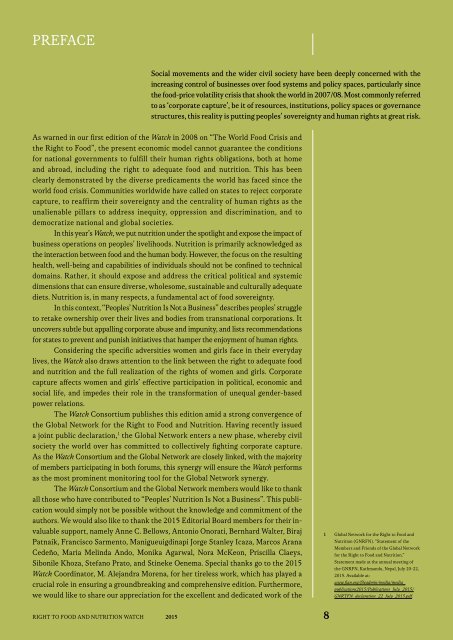RIGHT TO FOOD AND NUTRITION WATCH
1iNBHTY
1iNBHTY
Create successful ePaper yourself
Turn your PDF publications into a flip-book with our unique Google optimized e-Paper software.
PREFACE<br />
Social movements and the wider civil society have been deeply concerned with the<br />
increasing control of businesses over food systems and policy spaces, particularly since<br />
the food-price volatility crisis that shook the world in 2007/08. Most commonly referred<br />
to as ‘corporate capture’, be it of resources, institutions, policy spaces or governance<br />
structures, this reality is putting peoples’ sovereignty and human rights at great risk.<br />
As warned in our first edition of the Watch in 2008 on “The World Food Crisis and<br />
the Right to Food”, the present economic model cannot guarantee the conditions<br />
for national governments to fulfill their human rights obligations, both at home<br />
and abroad, including the right to adequate food and nutrition. This has been<br />
clearly demonstrated by the diverse predicaments the world has faced since the<br />
world food crisis. Communities worldwide have called on states to reject corporate<br />
capture, to reaffirm their sovereignty and the centrality of human rights as the<br />
unalienable pillars to address inequity, oppression and discrimination, and to<br />
democratize national and global societies.<br />
In this year’s Watch, we put nutrition under the spotlight and expose the impact of<br />
business operations on peoples’ livelihoods. Nutrition is primarily acknow ledged as<br />
the interaction between food and the human body. However, the focus on the resulting<br />
health, well-being and capabilities of individuals should not be confined to technical<br />
domains. Rather, it should expose and address the critical political and systemic<br />
dimensions that can ensure diverse, wholesome, sustainable and culturally adequate<br />
diets. Nutrition is, in many respects, a fundamental act of food sovereignty.<br />
In this context, “Peoples’ Nutrition Is Not a Business” describes peoples’ struggle<br />
to retake ownership over their lives and bodies from transnational corporations. It<br />
uncovers subtle but appalling corporate abuse and impunity, and lists recommen dations<br />
for states to prevent and punish initiatives that hamper the enjoyment of human rights.<br />
Considering the specific adversities women and girls face in their everyday<br />
lives, the Watch also draws attention to the link between the right to adequate food<br />
and nutrition and the full realization of the rights of women and girls. Corporate<br />
capture affects women and girls’ effective participation in political, economic and<br />
social life, and impedes their role in the transformation of unequal gender-based<br />
power relations.<br />
The Watch Consortium publishes this edition amid a strong convergence of<br />
the Global Network for the Right to Food and Nutrition. Having recently issued<br />
a joint public declaration, 1 the Global Network enters a new phase, whereby civil<br />
society the world over has committed to collectively fighting corporate capture.<br />
As the Watch Consortium and the Global Network are closely linked, with the majority<br />
of members participating in both forums, this synergy will ensure the Watch performs<br />
as the most prominent monitoring tool for the Global Network synergy.<br />
The Watch Consortium and the Global Network members would like to thank<br />
all those who have contributed to “Peoples’ Nutrition Is Not a Business”. This publication<br />
would simply not be possible without the knowledge and commitment of the<br />
authors. We would also like to thank the 2015 Editorial Board members for their invaluable<br />
support, namely Anne C. Bellows, Antonio Onorati, Bernhard Walter, Biraj<br />
Patnaik, Francisco Sarmento, Manigueuigdinapi Jorge Stanley Icaza, Marcos Arana<br />
Cedeño, Maria Melinda Ando, Monika Agarwal, Nora McKeon, Priscilla Claeys,<br />
Sibonile Khoza, Stefano Prato, and Stineke Oenema. Special thanks go to the 2015<br />
Watch Coordinator, M. Alejandra Morena, for her tireless work, which has played a<br />
crucial role in ensuring a groundbreaking and comprehensive edition. Furthermore,<br />
we would like to share our appreciation for the excellent and dedicated work of the<br />
1 Global Network for the Right to Food and<br />
Nutrition (GNRFN). “Statement of the<br />
Members and Friends of the Global Network<br />
for the Right to Food and Nutrition.”<br />
Statement made at the annual meeting of<br />
the GNRFN, Kathmandu, Nepal, July 20-22,<br />
2015. Available at:<br />
www.fian.org/fileadmin/media/media_<br />
publications2015/Publications_July_2015/<br />
GNRTFN_declaration_22_July_2015.pdf.<br />
<strong>RIGHT</strong> <strong>TO</strong> <strong>FOOD</strong> <strong>AND</strong> <strong>NUTRITION</strong> <strong>WATCH</strong> 2015 8


